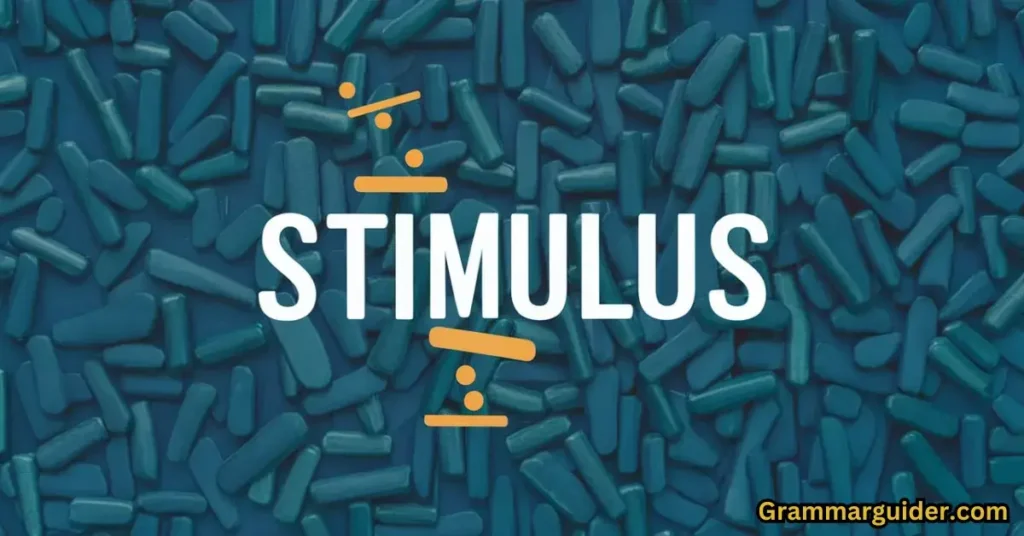When you encounter the word stimulus, you might wonder about its plural form. Is it “stimuluses” or “stimuli”? This question has puzzled many, especially since both forms appear in casual and academic contexts. Understanding how to use the plural of stimulus correctly involves diving into its linguistic roots and how it fits into English grammar.
Let’s break it down and explore the plural form of stimulus from both a grammatical and practical perspective, complete with examples to illustrate the differences. You’ll also find a table that summarizes the key distinctions, helping you remember the correct usage.
Understanding the Word ‘Stimulus’
Before jumping into the plural, let’s start by understanding what the word “stimulus” means.
A stimulus refers to something that encourages or triggers a response, typically in the context of behavior, biology, economics, or psychology. For instance, a loud noise might be a stimulus that causes a person to jump, or a financial incentive might act as a stimulus in economic terms.
In short, stimulus is a singular noun, and we use it to refer to a singular event or thing that causes a reaction.
So, What is the Plural Word of Stimulus?
The plural word of stimulus is stimuli. The term “stimuli” follows the rule for pluralizing Latin-derived words that end in -us, changing the suffix to -i instead of adding an -es or -s. This rule is quite common in scientific and academic fields.
For example:
- Stimulus → Stimuli
- Focus → Foci
- Cactus → Cacti
In general, if a word ends in -us and has a Latin origin, its plural form tends to follow this pattern, though there are exceptions.

Why Not ‘Stimuluses’?
Some people mistakenly use “stimuluses” as the plural of stimulus. However, this is grammatically incorrect. While English is a flexible language, certain rules apply when it comes to words derived from Latin. The word “stimulus” belongs to this group, and the plural of stimulus is stimuli, not “stimuluses.”
You can think of it this way: “stimuluses” is similar to saying “goed” instead of “went” or “mouses” instead of “mice.” While you might hear it in casual conversation, it’s not the grammatically correct form.
What Is the Plural of Stimulus? Real-Life Examples
To really understand how to use stimuli in everyday language, let’s look at some real-life scenarios.
Scenario 1: Email in a Scientific Setting
Let’s imagine you’re working at a research lab, and you need to email a colleague about different stimuli used in your recent experiment.
Subject: Results from the Recent Experiment on Behavioral Response to Different Stimuli
Dear Dr. Matthews,
I hope you’re doing well. I wanted to follow up on our recent discussion regarding the behavioral response of subjects to various stimuli.
As we reviewed, the two main stimuli—the light flashes and the sound bursts—had varying effects on the subjects’ reaction times.
The stimuli seemed to elicit quicker responses during the morning trials, but in the afternoon, the response times slowed significantly.
Would you like to schedule a meeting next week to discuss the next phase of our experiment? Let me know when you’re free.
Best regards,
Samantha K.
Research Assistant, Neurobiology Lab
In this example, “stimuli” is used to refer to the different factors that triggered a response in the subjects, following the plural of stimulus rule. It’s clear that the writer is discussing multiple instances or types of stimulus, so “stimuli” is the appropriate choice.
Scenario 2: Email in an Economic Context
Now, let’s take a look at how “stimuli” is used in economics. In this case, let’s imagine an economist emailing a government official about economic recovery measures.
Subject: Economic Stimuli and Recovery Strategies
Dear Senator Clarke,
I am writing to discuss the stimuli that have been most effective in stimulating economic recovery following the recent downturn. Based on our analysis, the stimuli introduced in the form of tax cuts and direct relief payments have yielded positive results in several sectors.
We have also observed that the impact of these stimuli has varied across different regions, with urban areas experiencing a quicker rebound compared to rural zones.
Would it be possible to schedule a call next week to further explore how these stimuli might evolve in the coming months?
Best regards,
Dr. Oliver Webb
Economist, Policy Research Institute
Again, in this example, “stimuli” is used to discuss multiple types of economic factors that encourage growth, demonstrating the correct use of the plural form of stimulus.

Can ‘Stimulus’ Have Other Plural Forms?
While stimuli is the standard plural, you may still encounter the occasional incorrect use of “stimuluses” in informal writing or speech. However, in academic, scientific, or professional settings, stimuli should always be used.
To help clarify, here’s a table comparing the two forms:
| Singular Form | Plural Form | Example Sentence |
|---|---|---|
| Stimulus | Stimuli | The experiment tested the effect of different stimuli on brain activity. |
| Stimulus | Stimuluses | Incorrect usage: The researchers observed several different stimuluses in the lab. |
As you can see, “stimuluses” is incorrect. Always choose “stimuli” in both formal and informal contexts.
Why Is ‘Stimuli’ Used for Plural?
The use of stimuli as the plural form comes from Latin. The word stimulus is derived from Latin, where many nouns ending in -us form their plurals with -i. English retains this structure for words borrowed directly from Latin, which is why stimuli is the proper plural form.
This rule applies not only to stimulus but to other words like:
- Cactus → Cacti
- Focus → Foci
- Thesis → Theses
Practical Use in Academic and Casual Conversations
In both casual and academic conversations, the correct form of stimulus in the plural should be stimuli. While you might occasionally hear “stimuluses” in everyday speech, it’s considered a mistake in formal writing or research. Always opt for stimuli when addressing more than one instance of a stimulus.
Here are some more examples where stimuli is used correctly in various fields:
- Biology: “Different environmental stimuli influence how plants grow.”
- Psychology: “The subjects responded to multiple stimuli, each triggering different brain reactions.”
- Economics: “Governments worldwide are exploring different stimuli to boost economic recovery.”
Conclusion:
The Correct Plural of Stimulus
To sum up, the plural of stimulus is stimuli. It’s important to remember this when you’re writing formally, whether in an academic paper, email, or research article. Using the correct form—stimuli—helps maintain the integrity of your writing and shows attention to detail.
Whether you’re working in the lab, analyzing economic data, or studying psychology, you now know the right way to refer to multiple stimuli. So, next time you encounter the word, remember: it’s stimuli, not “stimuluses.”

Harley Rose is a seasoned expert in English grammar and writing tips, blending years of knowledge and a love for language into her work. With a sharp eye for detail and a talent for making grammar accessible, Harley shares practical insights that help readers write with precision and flair. Her content is ideal for anyone looking to strengthen their writing skills and express themselves with confidence.

